Your Friday Bicycle Ballet
Don’t try this at home!
Is it just me or does it feel like 2020 is running out of ideas pic.twitter.com/lPOKVNP6tO
— Melvin of York (@MelvinofYork) October 23, 2020
Not So Precious Moments
You may recall “Precious Moments” from your grandmother’s house—you know, those little porcelain figurines that are disturbingly cute. Well, this being the time of year that it is, Marcy Wiegert has been repainting Precious Moments (among other) figurines to, as Gizmodo puts it, “look creepy and evil.” Or, as we’d put it, creepier and eviler.

OK, This Is Pretty Awesome
My neighbor’s “Skeleton Zoom” display rules. pic.twitter.com/VWFZiussaL
— Brian Stack (@BrianStack153) October 18, 2020
Dressed to Kill...Or Something
Over at Flashbak, a gallery of crazy Halloween costumes from the days of yore. This has to win the award for creepiest (not in the good way) costume(s) ever:
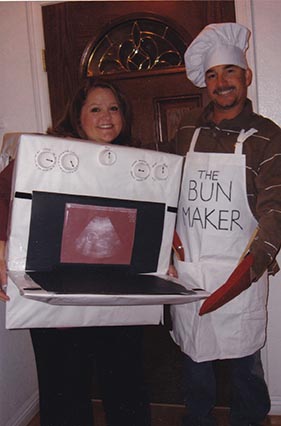
Bones of Contention
This time of year is the worst for archaeologists, what with our work constantly rising from the grave to wreak havoc on the living whilst we are trying to finish a plan. pic.twitter.com/x68CDlCk3M
— Ask An Archaeologist (@AskAnArch) October 29, 2020
Three Skeleton Car Key
Well, OK, A for effort, but... Says Core77:
Volvo had switched over to an eco-friendly, biodegradable wire coating made from soy. As it turns out, this soy coating is apparently quite tasty to rodents. A Forbes article on the subject reveals that some owners of late-model cars made by Volvo, Honda, Mazda and Toyota have experienced the same problem.
In other words, their green wiring was eaten by rats. There could be a remake of a classic episode of the radio drama Escape there...
There’s an Idea...
I think I might invite a random stranger from Twitter into each zoom meeting I have and say they’re part of my team and not brief them on anything at all and then just let them take the floor and steer things wherever they want.
— leekern (@leekern13) October 26, 2020
Name that Food
Engadget asks: “Wouldn’t it be helpful if a food tracking or recipe app could determine what you’re eating just by detecting what’s on your table?” Not really, no. But continue anyway:
The researchers initially wove the technology into a tablecloth, and envisioned it as particularly helpful for cooking. An app could suggest a meal based on what’s sitting on the table, while a diet app would know what you’ve had to drink. Scientists also imagine Capacitivo serving as a memory tool. It could remind you to take your earbuds before you head out the door, or remind you to clean up if you leave an empty food bowl.
That would last probably about five seconds, max, in most homes.
Fly and Touch the Sun...Or Not
I've never seen the Icarus story as a lesson about the limitations of humans. I see it as a lesson about the limitations of wax as an adhesive. RANDALL MUNROE (XKCD)
— Quite Interesting (@qikipedia) October 27, 2020
Fabric of Civilization
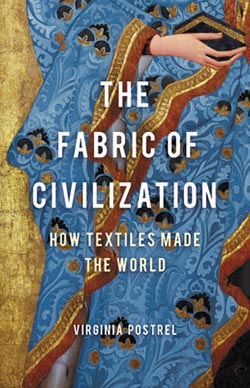 Our book pile is getting large and unwieldy, but this one heads toward the top: The Fabric of Civilization by Virginia Postrel, which traces the global history of textiles and the world, “from Paleolithic flax to 3D knitting.” Textiles and fashion has impacted just about every aspect of human civilization. Postrel wrote a pre-publication essay for The Wall Street Journal:
Our book pile is getting large and unwieldy, but this one heads toward the top: The Fabric of Civilization by Virginia Postrel, which traces the global history of textiles and the world, “from Paleolithic flax to 3D knitting.” Textiles and fashion has impacted just about every aspect of human civilization. Postrel wrote a pre-publication essay for The Wall Street Journal:
textiles. The word itself comes from the Indo-European root teks, which means to weave—the same root that gives us the word “technology.” From cave-dwellers twisting plant fibers into string to scientists embedding computer chips into threads, the story of textiles is the story of human ingenuity in all its manifestations: technical, artistic, economic and cultural.
The conflict between highly productive new technologies and fears of mass unemployment—“the robots are taking our jobs”—started with textiles. The Luddites, English weavers who smashed mechanical looms in the early 19th century, gave their name to technological resistance. Ironically, however, those weavers owed their own well-paid jobs to an earlier disruptive technology: spinning machines, which produced the yarn that weavers turned into cloth.
Everyone’s a Critic
Didn't realise it was illegal but makes sense. https://t.co/uqTwW3rwpY
— Jemaine Clement (@AJemaineClement) October 24, 2020
Sufferin’ till Sufferage
If you do not plan to head to the polls next week (if you haven’t done so already), remember that for many people here and around the world, the fight for the right to vote was a long, hard-fought battle. To show part of the struggle, students at RIT have put together a digital exhibit of classic women’s suffrage posters:
Women in the United States and in the United Kingdom fought for voting rights on either side of the Atlantic Ocean in the early 20th century, protesting for suffrage by picketing, going on hunger strikes, and using a savvy poster campaign. RIT students this semester dug into the suffrage movement’s use of graphic arts to design and create a digital exhibit of historical posters from Harvard University’s Schlesinger Library.
Women’s Suffrage Posters: A Virtual Exhibition celebrates 100 years of the ratification of the 19th amendment to the U.S. Constitution, which granted women voting rights—although it was not until the 1965 Voting Rights act that African American women were fully enfranchised. The digital exhibition is part of the university-wide program Moving Forward: Suffrage Past, Present, and Future.
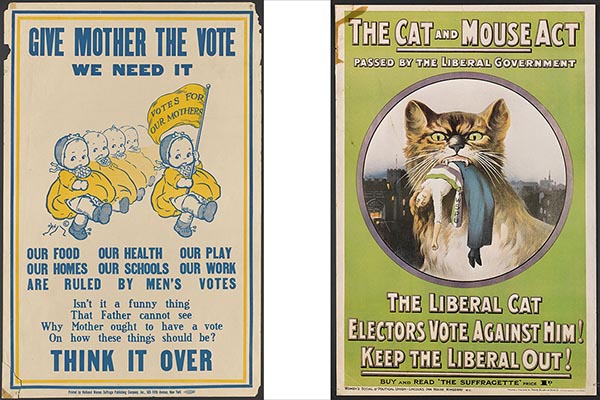
Swine Lake
Me in a tutu is an example of ballet-stuffing.
— Brent Piasko-Scream 4 (@BrentPiaskoski) October 23, 2020
All That Jazz
If you have ever wondered who was responsible for the distinctive look of many class jazz album covers, be sure to check out this gallery of covers designed by Reid Miles for Blue Note Records. “Oddly enough, Miles wasn’t reportedly a huge fan of hard-bop, the jazz form that Blue Note’s roster excelled in during his tenure. Perhaps, as others have suggested, a degree of distance from the subject benefits the designs.”
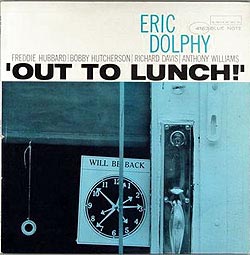
Plus C’est La Chose Meme
After 2 weeks of multiple health screens and asking everyone to quarantine, I surprised my closest inner circle with a trip to a private island where we could pretend things were normal just for a brief moment in time. #HorrorsofSpiderIsland @MST3K @AnnotatedMST pic.twitter.com/ORuXtN1dxM
— Erik David Even, Blue Thunder of Furinkan High?? (@Kunochan) October 27, 2020
King of Packaging, Redux
In last week’s Around the Web, we mentioned Burger King’s reusable packaging trial. We had some questions, some of which overlap with those that Core77 had.
I admire the effort--but I'm not sure they've thought the UX through. For example, let's say I order BK takeout and ask for the reusable packaging. Later that week I return to BK with the packaging, and I order a new meal through the drive-thru window, and ask for the reusable packaging again. Do I say "but don't charge me for it, because I'm bringing back reusable packaging from last time" and they take my word for it while I'm still at the intercom?
Or do they ring up the second set of reusable packaging while I'm at the intercom, but then when I arrive at the window and produce the first set of reusable packaging, they then adjust the amount in the register?
And, then, too:
I wonder if there will also be a gross-out factor. While the press release states that "Loop's cleaning systems have been created to sanitize food containers and cups, meaning each will be hygienically cleaned and safe before each use," I think this needs to be conveyed to customers visually; I don't think brown is a great color choice. If the packaging was white, and when I receive it I can see that it's gleamingly clean, I'd have more confidence in the system.
WTAF?
Currently reading a lot about cameras and lenses and yes, I know AF stands for AutoFocus, but I still think phrases like “Fast, precise AF” sound unnecessarily aggressive.
— Dara Ó Briain (@daraobriain) October 25, 2020
You Get What You Pay For
Here’s a lede that raises all sorts of questions:
A man who paid $150 for a “full-contact experience” with a black leopard says he had to undergo multiple surgeries after he was mauled by the fully-grown animal in an enclosure behind a Davie home.
So: who would actually offer a “full-contact experience” with a leopard? Apparently, a Florida man named Michael Poggi has a Facebook page (of course) on which he claims to run an animal sanctuary for rare and endangered animals. “Investigators say Poggi charged the 50-year-old Turner $150 for a ‘full-contact experience’ with his black leopard.”
So: what did Turner think a “full-contact experience” with a frickin’ leopard would involve? “[P]lay with it, rub its belly and take pictures.” Oy.
So: what happened next, as if you couldn’t guess? “[O]nce Turner walked inside the enclosure, the leopard attacked.”
So: our Around the Web PSA for this week is, if you see an ad for a “full contact experience” with some kind of animal, maybe look it up online first.
No Cakewalk
It's my 50th birthday in less than a month, and if restrictions continue I'm not going to be able to have a big party. So that's some good news at least.
— Richard Osman (@richardosman) October 21, 2020
Yule Be Ill
We have mentioned in past holiday-time Arounds the Web that KFC has a chicken-scented Yule log.
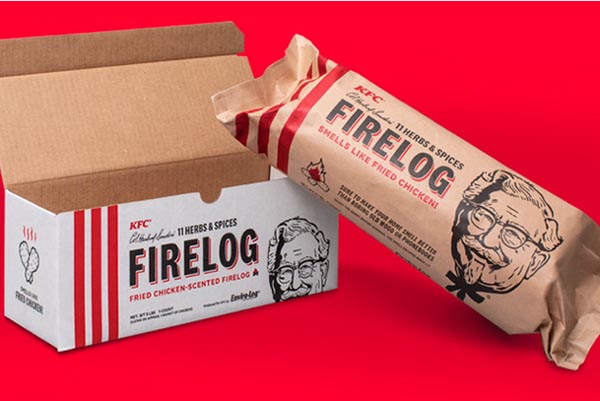
This is the third year that the log has been available and, for reasons passing understanding, it has sold out the previous two years. However, this year it is available in WalMart.
Another Sign of the Times
Another sign of the times. #COVID19 pic.twitter.com/xRmsN27YzS
— Kathy Lette (@KathyLette) October 22, 2020
This Week in Printing, Publishing, and Media History
October 26
1825: The Erie Canal opens, allowing direct passage from the Hudson River to Lake Erie.
1861: The Pony Express officially ceases operations.
1892: Ida B. Wells publishes Southern Horrors: Lynch Law in All Its Phases.
1946: Puerto Rican actress and author Holly Woodlawn born to walk on the wild side.
1958: Pan American Airways makes the first commercial flight of the Boeing 707 from New York City to Paris.
October 27
1858: Theodore Roosevelt born.
1904: The first underground New York City Subway line opens, later designated as the IRT Broadway–Seventh Avenue Line.
1923: American painter and sculptor Roy Lichtenstein born.
1932: American poet, novelist, and short story writer Sylvia Plath born.
Please, I want so badly for the good things to happen.
— S Joubert (@SofiaJoubert) October 27, 2020
- Sylvia Plath, born Oct 27, 1932 pic.twitter.com/JVcQKi4wQf
1939: English actor, comedian, screenwriter, and producer John Cleese born.
2004: The Boston Red Sox defeat the St. Louis Cardinals to win their first World Series in 86 years.
October 28
1726: The novel Gulliver’s Travels by Jonathan Swift is published.
1886: In New York Harbor, President Grover Cleveland dedicates the Statue of Liberty. The first ticker tape parade takes place in New York City when office workers spontaneously throw ticker tape into the streets as the statue is dedicated.
October 29
1969: The first-ever computer-to-computer link is established on ARPANET, the precursor to the Internet.
October 30
1885: American poet Ezra Pound born.
1938: Legitimately fake news—Orson Welles broadcasts his radio play of H. G. Wells’ The War of the Worlds, causing anxiety in some of the audience in the United States.
October 31
1795: English poet John Keats born.
1963: English singer-songwriter and guitarist Johnny Marr born.
November 1
1512: The ceiling of the Sistine Chapel, painted by Michelangelo, is exhibited to the public for the first time.
1604: William Shakespeare’s tragedy Othello is performed for the first time, at Whitehall Palace in London. A few years later...
1611: Shakespeare’s play The Tempest is performed for the first time, again at Whitehall Palace in London.
1941: American photographer Ansel Adams takes a picture of a moonrise over the town of Hernandez, N.M., that would become one of the most famous images in the history of photography.

1968: The Motion Picture Association of America's film rating system is officially introduced, originating with the ratings G, M, R, and X.
Anything catch your eye “around the Web”? Share it with us at [email protected].














